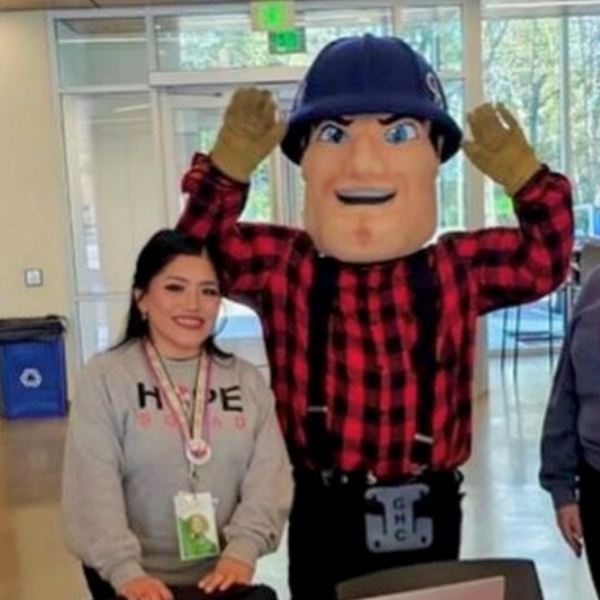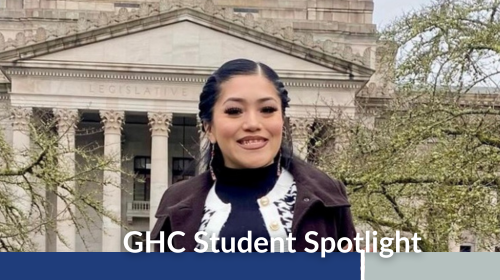Student Spotlight: Cari Tewee
Human Services Student

At Grays Harbor College, Cari Tewee is channeling her heritage, empathy, and dedication into a path of advocacy and service. As a Human Services AA student with plans to continue at Evergreen for her bachelor's, Cari’s journey is shaped by her vision for supporting her Native community and helping others to find trusted, compassionate support within their community.
Originally from Yakima, Cari moved to Grays Harbor after the loss of her parents. Her initial goal was to pursue chemical dependency counseling, but after meeting Kenji Seta, the Director of TRIO EOC (Educational Opportunity Center), at a tabling at The Moore Wright Group (TMWG), her perspective shifted. “Oh, my goodness, I love Kenji so much,” Cari laughs. This conversation with Kenji led her to the Human Services program, where she found more ways that she could help her community. Through Kenji, Cari connected with GHC’s TRIO program, finding a supportive community that has cared about her, supported her, and helped her grow.
Cari also deeply appreciates Lizbeth Sanchez for her invaluable support and guidance throughout her journey at GHC. Working together at the Civic Leadership Conference, Liz not only encouraged Cari to continue exploring her passions but also helped her to secure the Diversity and Equity award—a recognition that means a great deal to Cari as she strives to uplift her community. Liz’s mentorship and belief in Cari’s vision have been instrumental in helping her build confidence as she makes strides in her advocacy work. Cari credits Liz’s encouragement as a key part of her success at GHC.”
Cari’s heritage is a huge motivation in her studies and work. She recognizes that many Native people struggle with finding support that feels safe for them and is attuned to their culture. Back home in Yakima, Cari saw many Native community members that seemed distrustful of non-Native workers in treatment centers, which was preventing them from seeking any kind of help. She knows the impact of cultural barriers, and she’s focused on bridging that gap. Her time at GHC, she says, is about “filling her cup with knowledge” so that she can return to Yakima equipped to better serve her community with empathy and compassion. She holds certifications in domestic violence counseling, suicide prevention, recovery coaching, and more, amassing a “big old book full of certificates” that she hopes to bring back home to create lasting changes.
At GHC, her experience has been nothing short of transformative. She describes the college as a "mellow" environment, a place where staff and students support each other wholeheartedly. She said with a giggle, “It’s not like a jail.” In one of her current projects, she’s researching disabilities with a focus on nonverbal needs—an area she holds close to her as her son is also nonverbal. This project has allowed her to explore the policies and ethical codes affecting those who are nonverbal, while gaining a broader understanding that she can apply directly to those she hopes to help.
Cari’s passion for her Native heritage shines through her work with the Missing and Murdered Indigenous Women (MMIW) movement. Last year, she coordinated an event at TMWG, inviting families from across Washington to share stories, raise awareness, and bring state and community resources to families. She’s already planning next year’s event, aiming to increase visibility and support for Native families affected by this crisis by pulling in more resources, families, and supporters from around the state. She explained that the agencies who help these families after these missing or murdered women have been found only assist in the purchasing of a headstone; they do not aid with the burial, the funeral, or any other resources. “When a woman is lost, it leaves a hole in the community, far beyond just the immediate family,” Cari shares, “These families are losing a mother, a sister, an auntie, a breadwinner.” Her goal is to help create long-term programs that support families affected by MMIW tragedies, providing resources and helping them to heal and sustain themselves.
Outside of academics, Cari serves as the BIPOC Empowerment Coordinator at TMWG—a role that she has been thriving in. Her impact has already been tremendous; she has organized food distributions for communities with limited access to resources, specifically the community in Queets, ensuring that even remote areas have support. Before Cari took on the role, the people of Queets were unable to access the many great resources that TMWG were providing due to lack of transportation. They were left out of many important distributions of things like diapers, mattresses, and food until Cari was able to bridge that gap and facilitate these distributions being brought to their area.
Cari’s time at GHC has also allowed her to attend events like the Civic Leadership Conference, where she networked with humanitarians and state representatives, an experience she describes as "full circle." Her advisor, Destini Kirkwood, Human Resources Faculty member, has been a vital mentor, encouraging her to explore broader career options in human services. "With all the work you’re trying to do, I don’t think you should limit yourself to chemical dependency," Destini advised—a suggestion Cari took to heart.
When asked what her goals are, Cari shared that she’s planning to graduate in 2026 with her Human Services AA and then transfer to Evergreen. She’s grateful for the compassion she’s received from instructors and other staff at GHC, which has allowed her to care for her mental health while still pursuing her education. "The staff here is so understanding," Cari says, explaining how their support has kept her grounded and held her accountable while still being kind and caring about her needs.
To her fellow students, Cari offers advice that reflects her own personal determination: "Towards the end of the semester, it gets exhausting. Just push through. I know it’s hard, but you’ll feel so empowered at the end."
A passionate advocate, Cari is also involved with the American Red Cross and serves as president of GHC’s Hope Squad, a suicide prevention and mental health support group. Through her work, Cari is dedicated to breaking cycles of trauma and fostering healing in her community. She put it best when she said, “There are so many toxic cycles that need to be broken, hurt teachings that need to be untaught, and generational traumas that need to be healed. And I believe if our communities come together in love, support, understanding, and empowerment, we’ll take another step towards healing future generations.”
